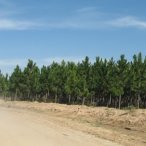English · Español

7 January 2014 | Interviews | Water | Resisting neoliberalism | Forests and biodiversity | Human rights
Stop Harvard
Impacts of tree monoculture plantations in Corrientes, Argentina
Download: MP3 (1.8 Mb)
For hundreds of years the Montaña community, in San Miguel department, Corrientes province, Argentina, enjoyed thousands of hectares ofarable lands to produce food and graze animals. However, in less than a decade, pine and eucalyptus monoculture plantations have taken over the horizon.
A group of activists from Friends of the Earth Argentina visited Corrientes as part of the Stop Harvard! campaign to raise awareness on the social and environmental destruction this US University is causing in the South American country. In Corrientes, the activists interviewed some of the people facing the reality of tree plantations every day.
Community member Adrián Obregon, from Montaña, is the representative of the Corrientes Family Farming Organizations. According to Friends of the Earth Argentina, it was Adrián who joined the visitors in mid-December to travel through the community, visit neighbors and listen to their stories.
Less than 1 kilometer from Adrián´s farm, following the path that goes to the primary school, the fields of Harvard University (Las Misiones company) display their “uniform green army” . But this doesn´t end here. When returning to the town by horse, through a path that used to be a lake 70 years ago, the members of Friends of the Earth Argentina stood less than 50 meters from new pine and eucalyptus plantations. “These belong to Las Misiones employees. There are plantations even inside the community, among the people”, said Adrián.
He also talked about how the forestry business leaves the traditional inhabitants –who speak Guarani as their first language and have co-existed with the ecosystem in an integrated and simple way- without underground water, and how this business affects their access to paths, health, education, in addition to the consequences on their traditional lifestyles.
“(…) For quite some time there has been a need for deeper wells. The ones that used to be five-meter-deep, are now 12-meter-deep, maybe more in some places. This is because pine and eucalyptus plantations consume large amounts of water”.
Wells are drying up and this in turn affects production and during the drought seasons “we can´t produce anything”, said Adrián. “So far, we´ve been producing what we always have, but there are things that we had to give up due to lack of stability, such as tobacco or cotton. People stopped producing them due to a lack of (good) prices. Intermediaries always keep the profits, and the producer is left with work and many times debts”.
Adrián said that the advance of forestry is a consequence of a lack of public policies for the family farming sector. “So provincial governments promote forestry, with subsidies from the National Government. (But) provincial governments don´t regulate where to grow or promote this type of crop, so there is no order, the human factor is not respected”.
He also made reference to the fact that roads become “inaccessible” when the trucks start to transport wood and it rains. “When the path is in poor conditions and you get sick, you have to call an ambulance –since we don´t even have an emergency room in the communities, the only one is located in Caiman- and because of the condition of the roads they can´t enter the community. Or when one needs the police, if the road is in poor conditions, they won´t come”. Children can´t go to school because the vehicle that takes them cannot enter Montaña.
About Las Misiones company, Adrián stated that there are no direct workers, or there are a few, because most of them are “outsourced”. The contractors sub-hire employees, they hire companies that perform rural services.
“Before, during this season, this was filled with maize, in all fields. But many people who made a living out of this had to leave, some of them sold their lands, some relatives stayed living in the farms, but most of them had to leave them”, regretted Adrián.
Nevertheless, he said: “we still believe life is in the countryside. We love it here, the nature, and that´s why we keep fighting against the forestry business. We believe one lives better in the countryside”.
Imagen: nosonbosques.com.ar







